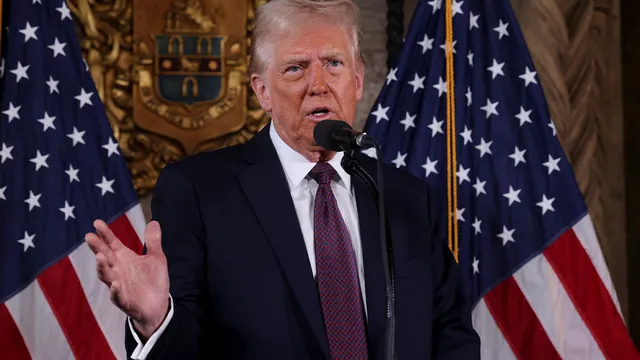
Donald Trump blasts Jimmy Carter for Panama Canal diplomacy
2025-01-11 07:03- Donald Trump, the president-elect, indicated willingness to use military force for Greenland and the Panama Canal.
- Foreign Secretary David Lammy refrained from condemning Trump's rhetoric, citing the importance of national security concerns.
- International responses highlight the complexity of U.S. foreign policy and regional dynamics regarding these strategic areas.
Express your sentiment!
Insights
In recent weeks, United States president-elect Donald Trump has made controversial statements regarding his interest in Greenland and the Panama Canal. He expressed a willingness to use military force or economic coercion to gain control over these strategic locations. During his comments, Trump noted the importance of Greenland for U.S. national security and asserted that the Panama Canal is vital to U.S. interests, implying dissatisfaction with historical diplomatic decisions that placed control of the canal in Panamanian hands. His remarks have prompted varied reactions internationally, highlighting tensions surrounding U.S. foreign policy under his administration. Foreign Secretary David Lammy commented on these threats, stating he prefers not to condemn the rhetoric of the U.S., implied to be a close ally, while recognizing the underlying concerns Trump raises regarding national security and China's growing influence in the region. Lammy's statements reflect a broader geopolitical context, wherein the U.S. has historically viewed both Greenland and the Panama Canal as significant geopolitical assets. He emphasized, however, that the self-determination of the Greenlandic people should be respected. The threat of military action from a major world power raises alarms, with European leaders, including Germany and France, issuing warnings against any aggressive posturing over Greenland. The situation highlights the volatile nature of international relations and security concerns as they pertain to U.S. interests. As global warming alters the Arctic landscape, access to Greenland becomes increasingly scrutinized, with implications for shipping routes and military strategy. Trump's comments reflect a nostalgia for past U.S. domination over the Panama Canal, criticizing former President Jimmy Carter's decision to relinquish control in favor of Panama. He regards this as a strategic error that diminishes U.S. influence in the region. The historical context underscores the significance of the canal built over a century ago and the ongoing debates about its legacy and implications for contemporary international relations. The reactions from political leaders and analysts alike emphasize the complexity of navigating these discussions in an increasingly multipolar world.
Contexts
The history of the Panama Canal control transfer is a pivotal chapter in both Panamanian and U.S. history, characterized by geopolitical maneuvers and national aspirations. The Panama Canal, originally completed in 1914, was built by the United States following an aborted French attempt. Although the canal was vital for international maritime trade, it also came with significant political and social implications for Panama, as it was initially controlled by the U.S. under the terms of the Hay-Bunau-Varilla Treaty, which granted the U.S. sovereignty over the canal zone while limiting Panama's influence in its own territory. This arrangement fostered resentment in Panama and ignited a desire for sovereignty and control over the canal by the Panamanian people. In the mid-20th century, a series of events catalyzed the drive for control over the canal. The rise of nationalism in Latin America, combined with the changing winds of U.S. foreign policy, created a backdrop for negotiation. Under President Jimmy Carter, the U.S. administration engaged in discussions that culminated in the Torrijos-Carter Treaties signed in 1977. These treaties laid the groundwork for the gradual transfer of control of the Canal to Panama, establishing a timetable to hand over authority by December 31, 1999. The agreements were met with mixed reactions in both countries; while many in Panama viewed them as a long-awaited acknowledgment of sovereignty, there was significant domestic opposition in the United States, predominantly from those concerned about national security and economic implications. The transfer of the Panama Canal's control took place at midnight on December 31, 1999. With this historic transition, Panama assumed full management of the canal, marking a significant moment of national pride and autonomy, reflecting over a century of struggle for sovereignty. The United States, having relinquished its control, maintained a cooperative relationship with Panama, focused on mutual interests such as trade, security, and governance. Post-transfer, Panama established the Panama Canal Authority (ACP), an autonomous entity responsible for the canal’s administration, modernization, and maintenance, aiming to enhance operational efficiency while ensuring financial sustainability, which has been critical to the country's economy. Since the transfer, the Panama Canal has experienced significant improvements and expansions, notably the completion of the third set of locks, which was inaugurated in 2016. This expansion has allowed larger vessels, known as New Panamax ships, to transit the canal, significantly increasing its capacity and global strategic importance. The evolution of Panama's control over the canal underscores not only a transformation in national identity but also reflects broader themes of post-colonial governance, international relations, and the economic interdependencies of the contemporary global landscape. The Panama Canal remains a crucial entity in global maritime trade, highlighting the continued importance of the sovereignty gained by Panama over its most significant asset.